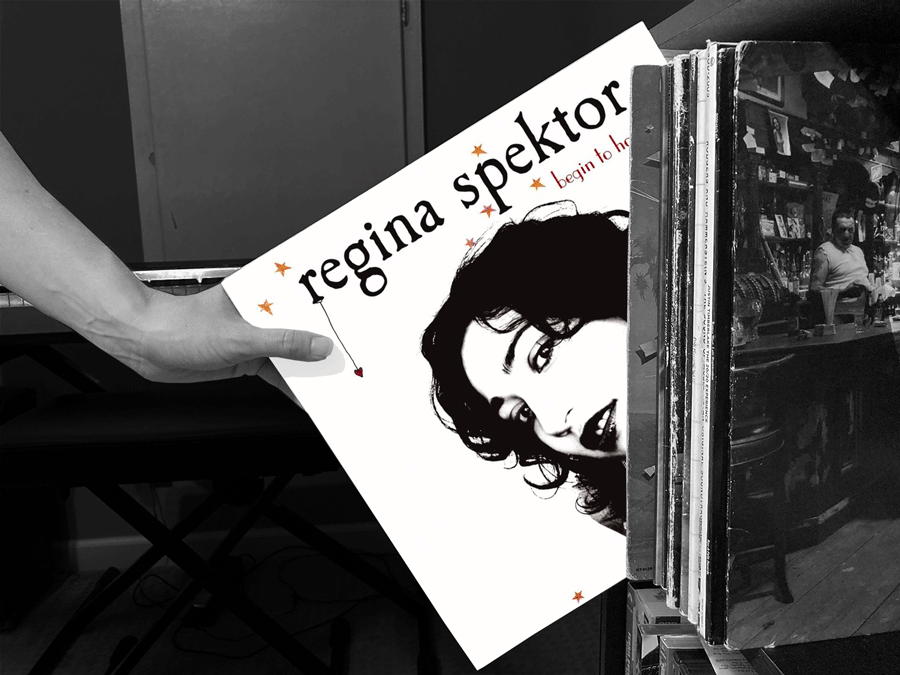|
Record Time is a recurring feature written by Flip Rushmore's Alex Smith. Comment with your favorite memories of Begin to Hope at the bottom of the story, and check out Flip Rushmore's latest release on Spotify.
My first "serious" relationship began when I was 16. And some of my favorite memories from that time were long drives soundtracked by the stereo in her hand-me-down Ford Taurus. Her older sister had moved out east, but had thankfully left behind a CD case with dozens of pop and alternative albums that I’d never heard before. At the time, I was in the midst of an exhilarating Wikipedia-and-Limewire crash course in rock history. I was the oldest in my family, so the Internet served as the cool sibling who told you how good Kid A was (or, at the very least, gave you their copy of Enema of the State).
Initially, I rejected much of my girlfriend’s taste in music (though, as the children of young Baby Boomers, we immediately bonded over Elton John’s “Your Song” and a few others). But my obsession with her soon became an obsession with the music she liked. I’d make CD mixes with music that we both enjoyed. Snow Patrol. Jack Johnson. Michael Franti’s mainstream turn. It was v v cute.
We came of age in the midst of a coffeehouse boom on “adult alternative” radio, when Cities 97 still swung its weight around Minneapolis-St. Paul and bludgeoned listeners with toothless back-to-back-to-back acoustic lineups like Howie Day➞Colbie Caillat➞Matt Nathanson (or Ingrid Michaelson➞Plain White Ts➞Mat Kearney … or Landon Pigg➞Feist➞Eric Hutchinson … mostly lily-white artists with the safest possible sounds, unless somebody like Franti decided he wanted to sell his soul to the right side of the dial for a few years). There were black sheep, of course, and Regina Spektor was one of them. The best-selling album of her career, Begin to Hope, had already been out for a few years. “Fidelity” would still slide into the Cities rotation every once in a while. Maybe “On The Radio.” But you were just as likely to hear her on budding indie giant 89.3 FM The Current. I didn't need the radio, though; my girlfriend had the CD in her car. Which meant I soon had it on my iPod. Which meant I knew the words pretty quickly. Spektor had charm for days. And she was quirky. So quirky that every review of her music for the rest of time will include the word “quirky.” (Aside: several years later, I finally dove into Spektor’s 2003 album Soviet Kitsch, which is a pretty exhilarating—albeit bare-bones—ride through her oddball mind. Depending on your mood, Soviet Kitsch is superior to anything else in her collection. Some trivia for those who don’t remember: Before Kitsch's release, Julian Casablancas and The Strokes helped kickstart Spektor’s mainstream success by pushing major labels to sign her, having her open for them during the Room on Fire tour, and recording a B-side duet with her. The Strokes will somehow make an appearance in every single one of our blog posts.) Spektor’s vocal delivery is always at the forefront when describing her music. She’s all over the place, stylistically. Her falsetto is a beautiful complement to her piano work. She belts. She whispers. She turns one syllable into seven. She insists on doing a heavy Bronx accent from time to time. All of a sudden she’s singing in French. And so on.
Begin to Hope has plenty of standout songs. The aforementioned “Fidelity”—an ode to the 2000 film ‘High Fidelity’—was the charting hit, crossing her over from freak-folk New York cafés to the rest of America. The also aforementioned “On The Radio” is a longtime favorite of mine. “Hotel Room” is a total earworm. And songs like the spooky “Après Moi” and the moving "Field Below" have stayed with me long after I lost my iPod. The one that has endeared itself to people most—despite never being an official single—is “Samson.” Originally recorded for her 2002 release Songs (very cool title, Regina), it was reborn with smoother production and a much quicker tempo. It's perhaps not as stirring as the original version, but packaged in such a way that it would reach much larger audiences. For my girlfriend and me, it was one of “our songs.” And, of course, it was a signature song for plenty of other couples. Listening now, the lyrics alternate between silly and deadly serious. Spektor’s voice is magnetic, carrying a well-crafted piano part along for the ride. It’s the sound of an artist reaching her potential. A couple years ago, I went to see Spektor live for the first time. I took my old girlfriend. The set closed with a trio of Begin to Hope favorites: “Fidelity,” “Hotel Song,” and “Samson.” More than a decade after the album hit shelves, everyone was waiting for those songs, especially the last one. “Samson” will always be the perfect ending to one of her shows. And—on the stereo of my wife’s old Ford Taurus—it was a beautiful beginning, too.
---
What was your favorite track on Begin to Hope? Let us know below, and check out Flip Rushmore's latest release on Bandcamp. Other Record Time posts: 50 Cent's Get Rich or Die Tryin' | The Killers' Hot Fuss
2 Comments
Fer
6/12/2021 05:02:02 pm
I love Begin to Hope! One of my favorites from her <3
Reply
10/20/2023 05:30:24 am
Record Time: Regina Spektor's 'Begin To Hope' was the beginning of something special" reflects the significance of Regina Spektor's album in her career and its impact on music. It suggests that this album marked a turning point, perhaps launching her into wider recognition or exploring a new musical direction, and that it played a pivotal role in her journey as an artist.
Reply
Leave a Reply. |
Archives
February 2024
Categories
All
|


 RSS Feed
RSS Feed